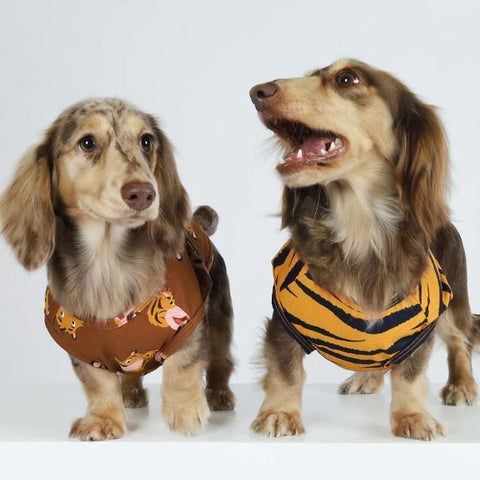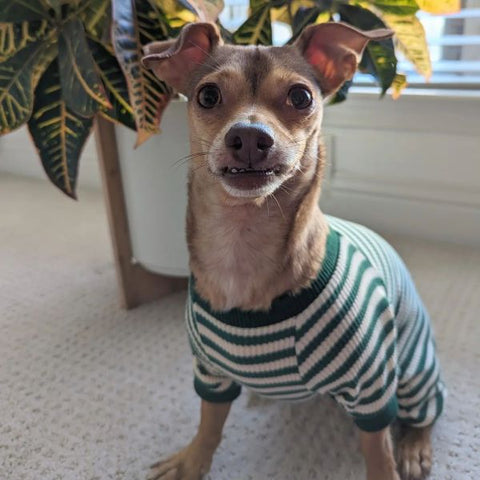Cómo limpiar la nariz de un perro secado
¿La nariz de tu cachorro es un grifo? Un perro con el hocico constantemente goteante puede volverte loco al ver cómo se forman rastros de mocos por dondequiera que pasa. Pero no te asustes: lidiar con el goteo nasal de un perro no es tan complicado. Es común que los cachorros se congestionen ocasionalmente. Pero como dueño responsable, necesitas entender por qué sucede y cómo ayudar a limpiar el hocico mocoso de tu perro.

Un moco que moquea puede indicar alergias, enfermedades o mocos atascados. Limpiar la mucosidad y cuidar adecuadamente su moco proporciona alivio y previene problemas mayores. En este artículo, hablaremos sobre las razones del moco en perros, métodos seguros de limpieza, remedios caseros y prevención, y cuándo llamar al veterinario. Con preparación y suministros, un trato amable y una supervisión constante, puedes mantener a tu cachorro cómodo cuando tenga mocos. ¡Te ayudaremos a que sus mocos vuelvan a estar como nuevos en un abrir y cerrar de ojos!
¿Qué hace que la nariz de un perro gotee?
Es normal que los perros tengan ocasionalmente una secreción nasal clara. Pero si notas secreción espesa y descolorida o pus saliendo de la nariz de tu perro, es una señal inequívoca de que algo más preocupante está sucediendo. Hay varias razones por las que la nariz de tu cachorro puede empezar a supurar.

Las alergias son una causa común de secreción nasal excesiva en los perros. Si alérgenos como el polenEl moho, las proteínas de los alimentos o los ácaros del polvo pueden afectar a tu peludo amigo, lo que puede causar hinchazón, irritación y un aumento de la producción de moco en sus fosas nasales. Además, la picazón causada por las reacciones alérgicas hace que los perros se froten la nariz constantemente, lo que irrita aún más la zona. Las infecciones bacterianas o virales en las fosas nasales o los senos paranasales de tu perro son otra causa frecuente de goteo nasal. Si la causa es una infección, a menudo verás moco espeso, amarillo o verde. Otros síntomas acompañantes, como estornudos, tos, letargo o fiebre, también pueden indicar una enfermedad o problemas sinusales. Curiosamente, ciertos olores también pueden provocar reacciones negativas en los perros, aunque estos no suelen ser la causa principal de la secreción nasal alérgica. Si alguna vez te has preguntado sobre el sentido del olfato de tu perro y cómo afecta su reacción a diferentes olores, descubrir... ¿Qué olores odian los perros? Puede brindar información sobre lo que puede hacer que su amigo peludo mire con malos ojos.
A los perros les encanta meter la nariz en todo, así que es muy posible que un pequeño objeto extraño, como una semilla de hierba o una ramita, se haya alojado en su cavidad nasal. Con tanto roce y resoplido para intentar desalojar el irritante, pueden provocar frotamiento, inflamación y secreción nasal. Infecciones dentales causadas por bacterias que se esconden en... enfermedad de las encías Y la mala dentadura es otra causa de problemas de drenaje nasal en los perros. La infección puede propagarse fácilmente de la boca a las fosas nasales y provocar secreción purulenta. El mal aliento canino suele ser un claro indicio de problemas dentales. Por último, los perros mayores de mayor tamaño a veces pueden desarrollar problemas benignos o incluso... tumores nasales cancerososEstos crecimientos suelen provocar secreción nasal atípica. Curiosamente, este comportamiento curioso es similar al de los perros, que a veces puede resultar desconcertante o problemático para sus dueños. Para comprender mejor y abordar estos instintos, infórmese más sobre... Comprenda y controle los hábitos de excavación de su perro..

Si su perro lleva más de una semana con goteo nasal constante, la cantidad de moco parece excesiva o parece estar indispuesto, es hora de que lo revise un veterinario. Este podrá diagnosticar la causa subyacente del goteo nasal y brindarle el tratamiento adecuado.
Preparándose para hurgarle la nariz a su cachorro
Antes de empezar a explorar las fosas nasales de tu perro, prepárate con los suministros adecuados para que no te estreses ni tú ni tu perro:
- Pañuelos suaves o bolitas de algodón: úsalos para secar suavemente cualquier goteo. ¡Cuidado, no estás restregando lasaña pegada en la sartén!
- Aerosol salino o gotas nasales: busque productos seguros para mascotas para eliminar los mocos de su cachorro.
- Paño húmedo y tibio: colóquelo sobre su hocico durante unos minutos para aflojar los trozos de mocos secos.
 Instagram: iggychelseaandme
Instagram: iggychelseaandme - Humidificador: agrega humedad al aire para lubricar los conductos nasales y aliviar la congestión.
- Delicias deliciosas: ten a mano las golosinas favoritas de tu perro para recompensarlo y mantenerlo relajado.
Elige una habitación tranquila y silenciosa para abordar el problema de la nariz de tu perro. Deja que se ponga cómodo y tranquilo antes de empezar a hurgar en su olfateador. Háblale suavemente y muévete despacio para no asustarlo mientras le inspeccionas y limpias la nariz. Tu paciencia y calma harán que el proceso sea más tranquilo en lugar de angustiante.
Cómo limpiar la nariz que moquea de tu perro
- Inspeccione la nariz con cuidado para detectar cualquier objeto extraño alojado en su interior. Busque semillas de césped, tierra u otros residuos atascados en las fosas nasales. Tenga mucho cuidado y no introduzca nada en el conducto nasal, ya que esto podría causar lesiones.
- Use un pañuelo suave para absorber la mucosidad o secreción de la nariz. Evite frotar con fuerza o irritar la piel. Sea delicado y paciente.
 Instagram: cavapruechon
Instagram: cavapruechon - Inclina ligeramente la cabeza de tu perro hacia atrás y rocía una solución salina segura para mascotas en cada fosa nasal para ayudar a eliminar la mucosidad y aliviar la inflamación interna. La solución salina ayuda a diluir la mucosidad para que tu perro pueda expulsarla.
- Permita que su perro sacuda la cabeza naturalmente para expulsar la solución salina y la mucosidad. Felicítelo con calma por cooperar, ya que sacudir la cabeza puede ser incómodo. Ofrézcale premios como refuerzo positivo.
- Continúe recompensando a su perro con pequeñas golosinas y cariño durante todo el proceso para que se mantenga tranquilo y cómodo mientras le limpian la nariz. Esto evita el estrés.
 Instagram: parti.princess.airyss.chiffon
Instagram: parti.princess.airyss.chiffon - Vigile el color, el grosor y la frecuencia de la secreción nasal durante varios días. Anote cualquier cambio para identificar las causas y determinar si se requiere atención veterinaria.
- Consulte a su veterinario de inmediato si la secreción nasal no desaparece en una semana o si empeora a pesar de la limpieza. No intente limpiar profundamente las fosas nasales. Deje los exámenes y tratamientos nasales exhaustivos en manos de profesionales veterinarios para evitar dañar a su perro.
Cómo cuidar con cariño la nariz de tu cachorro
Darle a tu perro un poco de cariño extra puede ayudar a aliviar el goteo nasal, además de mantener su hocico limpio. Una forma de aliviarlo es asegurarte de que tu cachorro se mantenga bien hidratado dándole más agua fresca.La hidratación adicional ayuda a diluir la mucosidad para que su cuerpo pueda limpiar mejor las fosas nasales congestionadas. Además de la hidratación, puede humedecer el aire alrededor de su perro usando humidificadores o colocando recipientes con agua en la casa. El aumento de humedad en el ambiente ayudará a aliviar la congestión nasal de su perro y facilitará la respiración.
Otro remedio casero útil es dejar que tu perro inhale el vapor de un caldo de pollo caliente sin cebolla ni ajo. Acercar la nariz al recipiente y respirar el vapor puede ayudar a aliviar la congestión. También puedes añadir una cucharadita de miel cruda local a la comida de tu perro. La miel tiene propiedades antimicrobianas y antiinflamatorias naturales que pueden aliviar los problemas de sinusitis.

Consultar con su veterinario sobre suplementos como vitamina C, aceite de orégano, omega-3 o antioxidantes puede reforzar el sistema inmunitario de su perro y ayudarle a recuperarse. Además, adaptar la dieta de su perro para incluir más alimentos que refuercen el sistema inmunitario y sean ricos en vitaminas A, C y E, como zanahorias, aceite de pescado y yogur, puede favorecer la curación. Para obtener una guía más completa sobre el bienestar de su perro, incluyendo nutrición, ejercicio y salud mental, consulte nuestra... 10 consejos esenciales para mantener a tu perro sano y feliz.
Implementar algunos remedios naturales puede aliviar el moqueo de tu cachorro, además de promover su salud nasal y respiratoria a largo plazo a medida que sus problemas mejoran. Siempre es recomendable consultar con tu veterinario antes de empezar con cualquier suplemento o remedio nuevo. Con un poco de cariño y el plan de tratamiento adecuado, ¡puedes devolverle el hocico a tu cachorro a su estado óptimo!

¿Tu perro está muerto?
¿Viviendo con alergias?
Es muy posible que las alergias sean la causa de que tu perro sufra de moqueo crónico. Hay varias señales que indican que las reacciones alérgicas son la causa del moqueo de tu cachorro. Para empezar, busca picazón. piel, orejas, patas u ojos. El lamido o mordisqueo excesivo centrado en las patas y la nariz también puede indicar alergias. Puede notar Más secreción nasal durante ciertas estaciones Cuando hay más polen y moho. Los mocos suelen ser transparentes y acuosos si la causa son alergias.
Los perros pueden desarrollar alergias a todo tipo de desencadenantes, como polen, moho, ácaros del polvo, pulgas, ciertos alimentos, productos químicos y más. Si sospecha que las alergias le están causando malestar a su cachorro, su veterinario puede realizarle análisis de sangre o cutáneos para identificar el alérgeno exacto.

Para que su perro se sienta mejor, el veterinario podría recomendar el inicio del tratamiento con antihistamínicos o esteroides para reducir la hinchazón, el picor y el exceso de mucosidad. También podría sugerir inyecciones antialérgicas para desensibilizar gradualmente el sistema inmunitario de su perro a la causa de su reacción. Además, se pueden recetar medicamentos antimicóticos o antimicrobianos si se desarrollan infecciones secundarias por bacterias o levaduras.
En casa, puede tomar medidas para reducir la exposición de su perro a los desencadenantes conocidos de alergias. Procure mantenerlo alejado de zonas con alto contenido de polen, lave su ropa de cama con regularidad, use purificadores de aire y aliméntelo con alimento hipoalergénico.¡Con un poco de diligencia y atención veterinaria proactiva, esas molestas alergias perrunas se pueden controlar para tener un cachorro más feliz y saludable!

Reflexiones finales
Averiguar por qué le gotea la nariz a tu cachorro es el primer paso: ¿se trata de alergias, una enfermedad o algo atascado en su hocico? Limpiar suavemente la nariz y aplicarle un espray salino puede eliminar la mucosidad y aliviar su dolor mientras sana.
Mantenerse hidratado, usar un humidificador, suplementos y evitar los alérgenos en casos de alergia puede ayudarles a recuperarse. Evite más goteo nasal en el futuro manteniéndose al día con las visitas al veterinario, las vacunas, la higiene y controlando los desencadenantes de sus alergias.

Vigila de cerca cualquier cambio en la secreción nasal de tu perro. Consulta con el veterinario de inmediato si el goteo nasal persiste o empeora. Con una limpieza minuciosa, cariño y cuidados preventivos, ¡podrás recuperar la humedad y la salud nasal de tu perro en un abrir y cerrar de ojos!
Tener un cachorro feliz y lleno de energía depende de la compasión y la vigilancia cuando surgen problemas como el goteo nasal. Aunque no es divertido lidiar con el goteo nasal, ¡tú puedes con esto! Con un poco de paciencia y cariño, tú y tu amigo de cuatro patas volverán a crear recuerdos más felices juntos en poco tiempo.














